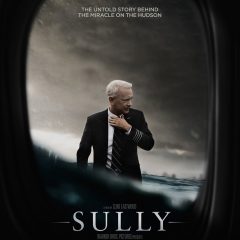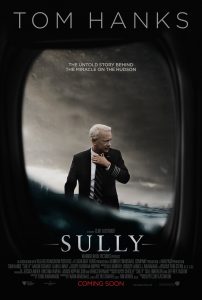
An In-depth Report by Agent TBD.
How do you make a feature length film about an event that only lasted for three and a half minutes? The short answer is that you show the event twice and you don’t start the first time until about a third of the way into the film.
The better answer is that you don’t make the movie about those three and a half minutes. You make it a character study of the man who lived through that event.
In many moviegoers’ minds, Tom Hanks is the only man who could have played Captain Chesley “Sully” Sullenberger and Clint Eastwood is the perfect choice to direct a film about the day Sully landed a damaged commercial airliner on the Hudson River without losing a single soul on board. However, special kudos need to be paid to screenwriter Todd Komarnicki and cinematographer Tom Stern for the unique ways they each deconstructed the aftermath of these events and used them to explore the human condition.
Clint Eastwood has never been known as a “flashy” filmmaker. His films are generally very straightforward and shot in a way that best showcases the performances. His deviations from this practice (J. Edgar) are usually met with mixed results. The narrative structure used by Komarnicki is different but refreshing.
The story begins after that fateful day and shows Sully and his First Officer Jeff Skiles (deftly played by Aaron Eckhart) bouncing back and forth between press interviews and questioning from the National Transportation Security Board (NTSB), who are investigating the “forced water landing.” Sully’s flashbacks and imaginings of how that day might have gone differently are frequently interspersed between these scenes. This makes the true conflict of the film a psychological one.

NEW YORK, NY – OCTOBER 07: Clint Eastwood and Tom Hanks on the set of ‘Sully’ on October 7, 2015 in New York City. (Photo by James Devaney/GC Images)
The NTSB investigators are not the real bad guys here. Sure they seem scary, but that is only because of what their findings could represent: doubt. Every single character in this movie is trying to do their job.
Sully is struggling to confirm that he did his correctly and did not needlessly endanger the lives of his passengers and crew. The only flaw is that the pacing makes it feel like the film takes place over a few days when it really took 18 months. I cannot decide whether this helps or hurts the stakes in the film.
Stern’s camerawork also goes a long way to set the stage for Sully’s dilemma. There are two moments in the film, one where Sully is sitting in a sauna and another where he is jogging over a foggy bridge, where our hero finds himself surrounded in smoke. It is moments like these that help accentuate his lack of clarity.
The camera movement also seems to be more fluid during the flashbacks. The exteriors and wide shots also take great care to show the scope of New York Harbor. Too many films today focus on extreme close-ups to make viewers feel the immediacy of the action. It is refreshing to see a film that remembers to give that action a larger context and isn’t afraid of showing the big picture.
The final act of the film shift gears and becomes much more traditional. Not just traditional Eastwood, but traditional Hollywood. The final beat of the film actually feels like it belonged in the ‘40s or ‘50s. This is because Sully has found his purpose and is focusing all of his energy on making that last metaphorical runway.

Sully Movie Poster
This film may be “based on a true story” but it is still a narrative fiction. Eastwood and company use Sully’s story as a backdrop for a much larger discussion. Hanks delivers one of his most moving performances of the last decade by living up to the “every man” ideal viewers have long associated with him.
No matter how dangerous his job may become, Sully is never overwhelmed by the circumstances and keeps his focus on solving the problem. Sully is probably the first film built for awards season to be released this year and it will certainly be a hard act to follow.
Rating: 4 (out of 5) American Tacos, which is a solid recommendation.
Agent TBD a.k.a. Edward O’Hare (@EdwardOHareTBD) is a voracious consumer of movies, television, comics and all things geek culture. From time to time he writes his thoughts about such things. He can currently be heard regularly on The Wicked Theory Podcast.
Read the Secret File of technical information and quotes from Sully.